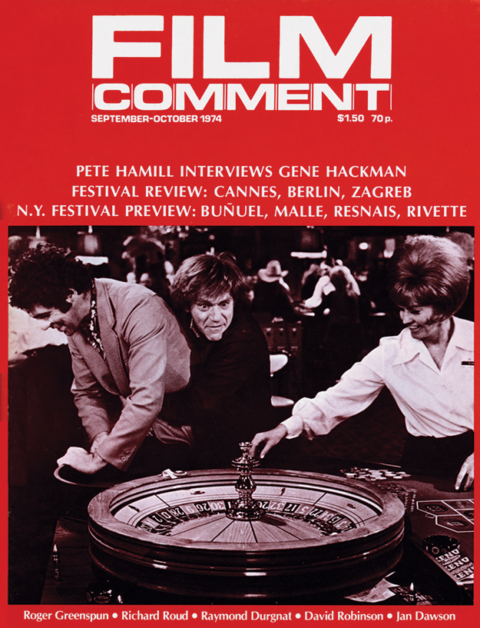
Independents: Documentary Films
The stylistic reformation of political cinema, begun with light-weight cameras and portable synchronous sound, has lessened the stranglehold of static documentary materials and voice-over that used to be the dull hallmark of earlier productions, giving us immediacy and verisimilitude instead. But behind these technological advances lurk the old aesthetic problems of form, montage and rhythm (the must truthful thesis can make the dullest film) and even more ancient problems of distribution: for if the insurrectional or reformist filmmakers proceed to anti-establishment films, the Establishment defends itself by rendering their exhibition impotent or restricting it to the margins of society; in less "democratic" societies, the film is forbidden, the filmmaker jailed. The history of all political cinema, however, has proven its viability and absolute necessity; "dents" are made in the consciousness of some and truth oozes into unexpected layers of society. If you want to be part of this oozing, a 16mm sound projector and payment of rental fee will bring any of the following recent examples to your home, club or school:

ATTICA (Cinda Firestone) Winner (with I. F. STONE’S WEEKLY) of the 1974 John Grierson Award for Best Documentary Film, this important, feature-length work recounts the chilling, fateful episodes of an American tragedy in newsreels, original documentary footage, interviews with inmates and prison officials. The film concludes that this “secret” place, briefly catapulted to national prominence and now once again invisible, is in reality a basic symbol of America today. (80 minutes, Attica Films, 789 West End Avenue, New York, N.Y. 10025.)
AMERICA: EVERYTHING YOU HAVE EVER DREAMED OF (Rhody Streeter, Tony Ganz) Working entirely with (savagely edited) documentary materials, Streeter and Ganz are unquestionably the most important proponents of slashing, satirical political cinema in America today, specializing in tendentious, acid self-indictments of people through their own words and the decor and landscapes they inhabit: the plastic retirement villages of the Southwest (in which even the lawn is artificial), the kitsch hotels for newlyweds (nude couples drinking champagne in heart-shaped tubs), the well-fed young Jesus freaks of California, the Muzak executives who confirm one’s worst suspicions. (26 minutes, Films Inc, 1144 Wilmette Avenue, Ill. 60091.)
DREAMS AND NIGHTMARES (Abe Osheroff). Sad wisdom, disarming honesty, a muted yet clear radicalism permeate this disturbing work. A former American fighter in the International Brigades returns to Spain to discover whether his struggle against Franco had indeed been in vain; what he finds and how (with rare documentary materials) he recounts both the story of that war and America’s role and continued involvement creates a unique history lesson for a new generation not yet acquainted with this indispensable lesson in turpitude and betrayal. (60 minutes, New Yorker Films, 43 West 61 Street, New York, N.Y. 10023.)
THE FRAMEUP OF MARTIN SOSTRE (Pacific Street Film Collective). This new film by the makers of the outstanding RED SQUAD (available from the same source) brings to wider attention the fate of a Black militant apparently convicted on trumped-up drug charges to 41 years. The evidence presented is detailed and damning; the interviews with prosecutors and others revealing; most surprising, however, is Sostre himself: a charismatic, incisive, highly articulate leader-type, an impression further strengthened by his tireless, often successful attempts to change the prison system “from within.” A thoughtful, important work. (30 minutes, Pacific Street Film Collective, 58 Douglas Street, Brooklyn, N.Y. 11231.)
CAMPAMENTO (Tom Cohen and Richard Pearce). A reasoned, radical study of a “utopian” city entirely created by poverty-stricken squatters from the Chilean slums who, under Allende, occupied unused Church land to fashion a new commune-type society. Their enthusiasm, originality and humanity have since been transmuted into a somber memento; one wonders what happened to the leaders, forever “indicted” on film. (26 minutes, Impact films, 144 Bleecker Street, New York, 10012)
I.F. STONE’S WEEKLY (Jerry Bruck). Brilliant, witty, hard-hitting visit with an extraordinary American—impassioned journalist-ferret-subversive I.F. Stone, who believes all governments are run by liars and employs “maniacal zest and idiot zeal” to catch them. This affectionate, moving revelation of a man—already a contemporary classic—is a memorable achievement in political filmmaking. (62 minutes, I.F. Stone Project, P.O. Box 315, Franklin Lakes, N.J. 07417.)
SOUTH VIETNAM—A QUESTION OF TORTURE (Michael Beckham) Factual, detailed report on the continued and current use of political torture in South Vietnam turns into an indictment of America’s clear involvement both financially and administratively. Produced by Amnesty International. Interviews with doctors and victims provide visual data difficult to refute; and a group of paralyzed ex-Tiger cage prisoners, painfully pushing themselves along floors—(no wheelchairs, needless to say) remain in one’s memory. (27 minutes, Granada Television International Ltd, Suite 3468, 1221 6th Avenue, New York, N.Y. 10020.)
YOU HIDE ME (Kwate Nee Owoo). Searing indictment of the “rape” of African art by its forcible removal (by colonialists and missionaries) to the basements of the British and other museums; unseen in the West, unavailable to the Africans. The anti-imperialist militancy of the narration suddenly assumes further urgency when these artifacts in museum storage are revealed as ravishing, sophisticated masterpieces of world art. (20 minutes, Tri-Continental Films, 333 6th Avenue, New York, N.Y. 10014)
A CHEMICAL FEAST. Ferocious cooking lesson by Marshall Efron in which this subversive concocts an utterly synthetic lemon pie by simply mixing together all the chemical ingredients listed on the package. (11 minutes, Benchmark Films, 145 Scarborough Road, Briarcliff Manor, N.Y. 10510.)







